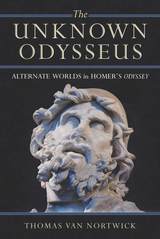
This is the long-awaited work on Homer's Odyssey by one of our foremost teachers and scholars of the classics--John H. Finley, Jr. Already, generations of students at Harvard have benefited from his knowledge and understanding of Homer's words and world. Now his thoughts on the Odyssey are woven together in this remarkable volume.
Finley begins by arguing the unity of design in the Odyssey, and shows the connection between the actions of three main characters: Telemachus' maturity brings Penelope to her long-delayed decision for remarriage, which, by producing the bow as marriage-test, gives the unknown Odysseus his means of success against the suitors.
Finley also suggests that the poem is a kind of half-divine comedy. About an older man's glad return, it contrasts to the Iliad's story of young man's death far from home. It is a comedy to the Iliad's tragedy and, like Shakespeare's Tempest, it brings the absent king to knowledge which, though initially unwelcome, proves his and others' happiness.
Throughout his book, Finley applies a lifetime's learning to a work that is universally recognized as one of the highest achievements of our civilization. At a time when Homer is in danger of being swallowed by specialists, it is important to recognize and uphold the poet's basic concern for life and myth and legend. Such sympathy combined with knowledge is Finley's fine achievement.

---Choice
---Bryn Mawr Classical Review

The Unknown Odysseus is a study of how Homer creates two versions of his hero, one who is the triumphant protagonist of the revenge plot and another, more subversive, anonymous figure whose various personae exemplify an entirely different set of assumptions about the world through which each hero moves and about the shape and meaning of human life. Separating the two perspectives allows us to see more clearly how the poem's dual focus can begin to explain some of the notorious difficulties readers have encountered in thinking about the Odyssey. In The Unknown Odysseus, Thomas Van Nortwick offers the most complete exploration to date of the implications of Odysseus' divided nature, showing how it allows Homer to explore the riddles of human identity in a profound way that is not usually recognized by studies focusing on only one "real" hero in the narrative. This new perspective on the epic enriches the world of the poem in a way that will interest both general readers and classical scholars.
---David Quint, London Review of Books
"Thomas Van Nortwick's eloquently written book will give the neophyte a clear interpretive path through the epic while reminding experienced readers why they should still care about the Odyssey's unresolved interpretive cruces. The Unknown Odysseus is not merely accessible, but a true pleasure to read."
---Lillian Doherty, University of Maryland
"Contributing to an important new perspective on understanding the epic, Thomas Van Nortwick wishes to resist the dominant, even imperial narrative that tries so hard to trick, beguile, and even bully its listeners into accepting the inevitability of Odysseus' heroism."
---Victoria Pedrick, Georgetown University
Thomas Van Nortwick is Nathan A. Greenberg Professor of Classics at Oberlin College and author of Somewhere I Have Never Travelled: The Second Self and the Hero's Journey in Ancient Epic (1992) and Oedipus: The Meaning of a Masculine Life (1998).
Jacket art: Head of Odysseus from a sculptural group representing Odysseus killing Polyphemus in the Museo Archeologico Nazionale in Sperlonga, Italy. Photograph by Marie-Lan Nguyen.
READERS
Browse our collection.
PUBLISHERS
See BiblioVault's publisher services.
STUDENT SERVICES
Files for college accessibility offices.
UChicago Accessibility Resources
home | accessibility | search | about | contact us
BiblioVault ® 2001 - 2024
The University of Chicago Press









